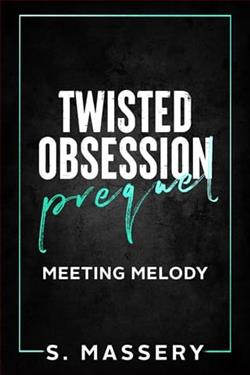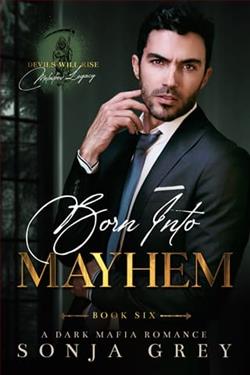Page 1 of The Billionaire's Bargain
one
. . .
Alice
My shoulders acheas I balance the overloaded tray of coffee orders, weaving between tables like I'm performing some exhausted ballet. Six more hours of this shift to go, and the rent's still short. The café hums with morning conversations and the hiss of the espresso machine—sounds that usually fade into white noise after three years of working here, but today they scrape against my nerves like fingernails on glass. I tuck a strand of hair behind my ear and plaster on my service smile as I approach the corner booth, where the air seems to thicken around the dark-suited man waiting there.
I've been on my feet since five this morning. My second job. The first—night shifts at the convenience store—ended at midnight. Sleep is a luxury I can't afford, not with bills piling up and my student loans hanging over me like a guillotine blade. Each step across the polished floor takes effort, but I've learned to move with purpose. To make it look effortless.
"Table six, Alice." My manager, a perpetually harried woman with permanent frown lines, nods toward the back corner where a business meeting seems to be wrapping up. "Full service, these are important clients."
Translation: don't screw this up or it's your ass.
I nod and adjust my grip on the tray—five specialty coffees, all different, all obscenely expensive. The kind people order when someone else is paying. My fingertips are callused from years of carrying hot plates and cups, but the weight still strains my wrists.
That's when I first notice him.
Not because he's loud—he's anything but. It's the quiet authority that draws my attention. The way the three men in cheaper suits lean toward him when he speaks, like plants seeking sunlight. The way his presence seems to command the corner of the café without any visible effort.
He sits with his back against the wall, a position that lets him survey the entire room. His suit is different from the others—the fabric catches the light in a way that whispers of expense without shouting it. Dark hair, immaculately styled. Strong jaw, clean-shaven. I can't make out the color of his eyes from here, but I can feel their intensity even at a distance. He's older than me—mid-thirties, maybe—with lines at the corners of his eyes that speak of experience rather than age.
My stomach tightens as I approach. Not just from nerves about serving "important clients," but from something more primal. A recognition of danger, perhaps. Not physical threat, but the danger of disruption. As if this man could somehow upset the careful balance of my exhausting but predictable life.
I shake off the feeling. He's just another customer. Probably some mid-level executive with an inflated sense of importance.
"Your coffees, gentlemen," I announce as I reach the table, working to keep my voice steady and professional. "TwoAmericanos, one cappuccino, one latte with an extra shot, and one black coffee."
The conversation pauses. Four pairs of eyes turn to me, but only one set makes contact. His. They're gray—not the soft gray of morning fog but the hard, clear gray of steel. They lock onto mine with such sudden, complete focus that I nearly stumble.
"Thank you," he says, his voice low and rich. The words are ordinary. The delivery is not. He speaks as if he's considered every syllable, found it satisfactory, and released it with precise intention.
I nod and begin setting down the cups, working around the spread of papers and tablets on the table. My hands are steady—they always are—but my awareness of him intensifies with each passing second. The air between us seems charged, like the moment before lightning strikes.
Just as I'm placing the last cup—his, the black coffee—a businessman from the adjacent table stands up suddenly, bumping into me from behind. The jolt travels through my body, amplified by fatigue and surprise. My fingers slip. The mug tilts.
Time slows horrifically. I watch as the dark liquid arcs through the air with elegant malevolence. It splashes across the pristine white of his shirt, the perfect charcoal of his suit jacket. Droplets spatter the table, the papers, even one of his companions.
Chaos erupts. The other men jump back, napkins are grabbed, exclamations made. But he remains perfectly still, looking down at the spreading stain as if observing an interesting natural phenomenon.
"I'm so sorry," I gasp, mortification flooding me like ice water. My face burns hot enough to scald. "I didn't—I wasn't?—"
I grab napkins frantically, dabbing at his chest without thinking. It's only when my fingers press against the solid warmth beneath the soaked fabric that I realize what I'm doing—touching a stranger, a customer, without permission. I snatch my hand away as if burned.
"I'll get more napkins," I stammer, ready to flee.
His hand catches my wrist. Not roughly, but with the same precise intention that colors his speech. His fingers are warm and dry, encircling my wrist completely.
"It's all right," he says, and the room seems to quiet around us. His gaze hasn't left my face, hasn't shown a flicker of anger or disgust. If anything, there's something like curiosity there. "Accidents happen."
I'm frozen, caught between the pull of escape and the tether of his grip. His thumb moves once across my pulse point, so lightly it might be an accident.
"I'm really sorry about your suit," I manage, finding my voice. "The café will pay for the cleaning, of course."
A small smile touches his lips. It doesn't reach his eyes, not fully, but it transforms his face from intimidating to something more dangerous—appealing.
"Don't worry about the suit." He releases my wrist slowly, as if making sure I won't bolt. "What's your name?"
The question surprises me. Customers rarely ask for my name, even though it's printed on my name tag. They see the uniform, not the person.















